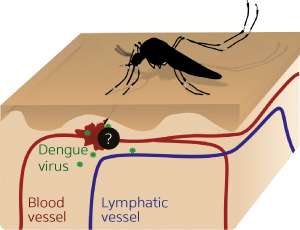Scientists identify the skin immune cells targeted by the dengue virus

Cells in the skin immune system that act as 'gateways' enabling the dengue virus to spread through the body have been identified by A*STAR researchers.
Dengue is a global health concern that is growing at an alarming rate. Approximately 390 million people are infected by the virus each year, and the World Health Organization now estimates that about half of the world's population is at risk of infection. Although the virus generally causes relatively mild symptoms such as fever, headaches and rashes, in certain cases it can lead to potentially fatal organ failure.
Like malaria, dengue is transmitted by mosquitoes and enters the body via the skin. However, it had not been clear which components of the skin were involved in spreading the virus throughout the body—until now (see image).
By infecting skin from human donors and examining its response to infection, Katja Fink at the A*STAR Singapore Immunology Network and co-workers have discovered that the dengue virus targets certain immune cells in human skin. Specifically, they found that the main target of the virus is antigen-presenting cells—key players in initiating an immune response as they present microbes to immune cells. On further analysis, the scientists discovered that only certain antigen-presenting cells were susceptible to infection, namely macrophages and three of the four kinds of dendritic cells.
There is a certain irony to these results as they indicate that these skin immune cells are simultaneously an entry point of the dengue virus into the body and leaders in the fight to rid the body of the virus.
The findings are critical to the fight against dengue. "It is vital to understand the initial steps that occur during a natural infection, as these are the basis of a subsequent immune response," explains Fink. "By learning which cells will eventually present antigens to T cells, we can predict the type of response we need to trigger during immunization or vaccination in order to create an efficient and lasting memory against the virus."
Fink is a strong advocate of the approach adopted in the study. "We believe that working with primary human cells and tissue, no matter how tedious and difficult it can be, provides very real insight into the biology of dengue disease," she says.
In the future, the team intends to study the responses of dengue-virus-specific T cells activated by different subsets of infected dendritic cells.
More information: "Selective susceptibility of human skin antigen presenting cells to productive dengue virus infection." PLoS Pathogens 10, e1004548 (2014). dx.doi.org/10.1371/journal.ppat.1004548



















